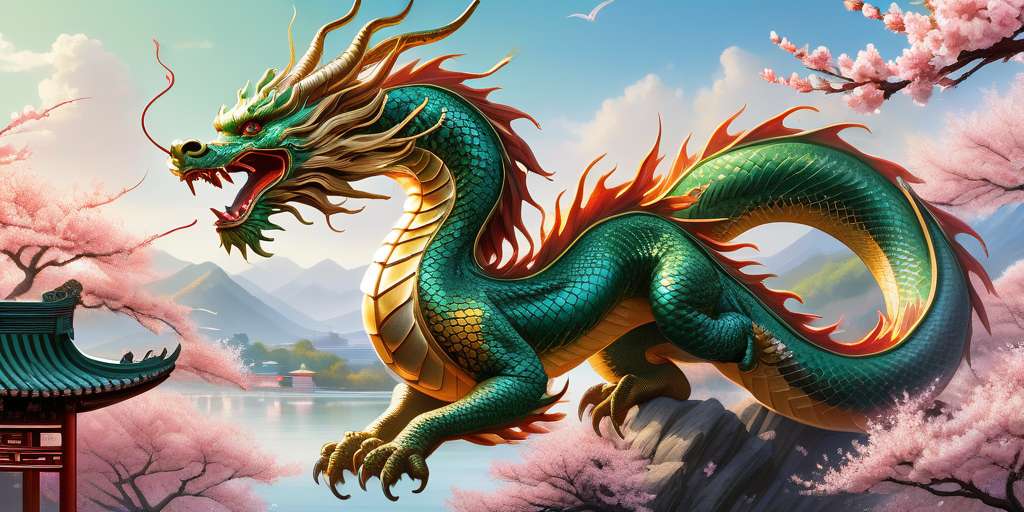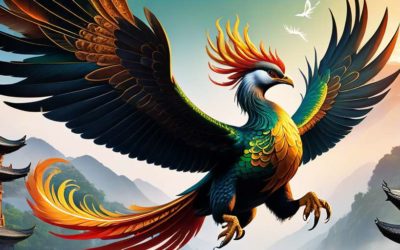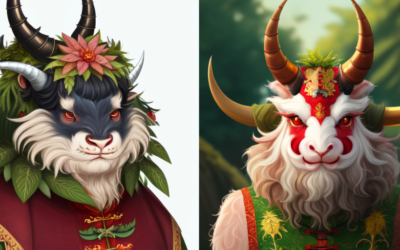Chinese Mythology

Chinese mythology is rich and fascinating, replete with gods and goddesses that are central to their culture.
The power of the Dragon, the Jade Emperor, the phoenix, the qilin and many other mythological creatures are necessary to understand that particular worldview.
There are also folk legends of love and romance, such as that of Chang’e and Hou Yi.
This mythology has had a great impact on literature, arts and folk beliefs in China.
In this article we will explore the diversity and importance of Chinese mythology in its cultural context.
Chinese Mythology: Gods and Goddesses
Chinese mythology is replete with an extensive variety of deities, both male and female, who play significant roles in their culture and beliefs.
These deities represent different aspects of the universe and are worshipped and revered by the Chinese people.
The Jade Emperor and the Supreme Gods
The Jade Emperor, also known as Yu Huang, is considered the supreme ruler of heaven in Chinese mythology.
He is credited with controlling and administering all aspects of existence.
Alongside him, we find other supreme gods who play important roles in the Chinese pantheon.
Gods of fortune and prosperity
In Chinese mythology, there are a large number of gods associated with fortune and prosperity.
Some of them include Caishen, the god of wealth, and Zhao Gongming, the god of money and business.
These gods are worshipped and consulted to attract good luck and prosperity in different aspects of life.
Goddesses of the earth and creation
We also find goddesses who are associated with the earth and creation.
A prominent example is Nüwa, a creator goddess who is believed to have repaired the sky and earth after a great flood.
There are also other goddesses associated with fertility and the protection of nature.
Mythological creatures in Chinese mythology
Chinese mythology is full of mythical creatures that stir the imagination and evoke the essence of the supernatural.
Below, we will explore some of the most prominent creatures, starting with the mighty dragon.
The power of the dragon in Chinese mythology
The dragon is undoubtedly one of the most iconic and revered creatures in Chinese mythology.
It is attributed with supreme power and is considered a symbol of good omen and prosperity.
In Chinese mythology, the dragon is the ruler of the oceans and rivers, and also has the power to control the weather and bring beneficial rain for crops.
The dragon is depicted as a majestic creature with scales, sharp claws and a long tail.
It is often depicted with the ability to fly and spit fire.
Chinese emperors identified themselves with the dragon, considering themselves direct descendants of this sacred creature.
Even today, the dragon has a strong presence in Chinese festivities and celebrations, such as the famous Dragon Festival.
Other outstanding mythical creatures
- Phoenix: The phoenix is another important mythical creature in Chinese mythology.
It is attributed with the power of resurrection and represents virtue, benevolence and honor.
It also symbolizes Yin, the feminine energy. - Qilin: The Qilin is a mythical creature that resembles a mixture of various animals, such as the unicorn and the dragon.
It is considered a benevolent and protective being, bringing good fortune and happiness.
These mythical creatures, along with the dragon, form an essential part of Chinese mythology and have left a deep imprint on the culture, art and beliefs of this ancient country.
Their presence in Chinese stories and festivities demonstrates the fascination and respect for them to this day.
Legends and folktales
Chinese mythology is full of fascinating legends and stories that have been passed down from generation to generation.
These stories have captured the imagination of the Chinese people and have become an integral part of their culture and traditions.
Love and romance in Chinese mythology
One of the recurring themes in Chinese mythology is love and romance.
The story of Niu Lang and Zhi Nü, also known as the legend of the Fairy Weaver, tells a beautiful tale of love between a shepherd and a fairy.
This touching story is celebrated every year on the Qi Xi Festival, known as Lovers’ Day in China.
In addition to this legend, there are other love stories that have captivated the Chinese over the centuries.
These mythological tales explore different facets of love and convey valuable lessons about the importance of loyalty, understanding and overcoming obstacles in romantic relationships.
The legends of Chang’e and Hou Yi
Another of the most famous legends of Chinese mythology is the story of Chang’e and Hou Yi.
This tale tells the story of a brave archer named Hou Yi and his wife, Chang’e, who becomes the Moon Goddess.
The legend of Chang’e and Hou Yi is a tale of sacrifice, love and eternity.
In this story, Hou Yi saves the world from a disaster caused by terrible monsters and, as a reward, is granted an elixir of immortality.
However, instead of drinking it himself, he decides to give it to his beloved wife, Chang’e.
As a result, she rises to the moon and becomes a symbol of eternal love.
Other important mythological stories
- The Story of Yu the Great: This story tells how Emperor Yu fought disastrous floods and became a legendary hero.
- The Voyage of Sun Wukong: One of the best known stories in Chinese mythology, it narrates the adventures of the Monkey King in his quest for immortality and his struggle against the gods.
- The Story of Xi Wangmu: Xi Wangmu, also known as the Queen Mother of the West, is one of the most important deities in Chinese mythology.
Her story focuses on the power of immortality and vitality.
These are just a few of the many stories and legends that have enriched Chinese mythology over the centuries.
Each with its own charm and profound messages of wisdom.
Influence of Chinese mythology on culture
Chinese mythology has left a deep imprint on the country’s culture throughout history.
Its stories and mythological characters have influenced various artistic manifestations, as well as religion and popular beliefs.
Impact on literature and the arts
China’s rich mythology has been a source of inspiration for many writers and artists throughout the ages.
Its characters and legends have been the protagonists of numerous literary works, from novels and poems to plays and paintings.
The heroes and gods of mythology have also been portrayed in countless paintings, engravings and sculptures, enhancing their beauty and power.
Importance in religion and popular beliefs
Chinese mythology has had a great influence on the country’s traditional religion and popular beliefs.
Many mythological deities are worshipped and considered protectors or providers of blessings in different aspects of life.
Folk beliefs, based on Chinese mythology, encompass rituals, festivals and practices that have been passed down from generation to generation.
These beliefs influence people’s daily lives, from the choice of names to superstitions related to love, luck and prosperity.
- Chinese names often have mythological connotations, as many people seek names that reflect positive qualities associated with the gods and goddesses of Chinese mythology.
- Traditional festivals, such as the Lantern Festival and the Ghost Festival, have mythological roots and are celebrated with rituals in honor of gods and ancestors.
- Superstitions, such as avoiding the number four because of its association with bad luck, originate in the country’s legends and mythological beliefs.
Fenghuang, the Chinese phoenix
The Fenghuang, also known as the Chinese phoenix, is a mythological bird that has played an important role in the country's culture for thousands of years. It represents the union of yin and yang, symbolizing virtue and grace. In addition, there is also a village...
Pangu ,the creator of the world
Pangu is a Chinese mythological figure that plays a fundamental role in Chinese cosmogony. According to legends, Pangu was the creator of the world and his birth marked the beginning of existence. He is also credited with the important task of separating heaven and...
Chinese dragons: Mythical creatures and symbols of power in Chinese culture.
Chinese dragons are legendary creatures of great significance in Chinese culture. Symbols of power and nobility, they have been revered throughout history. With their unique composition, which includes characteristics of various animals, Chinese dragons possess...
Subscribe
If you want to receive in your mailbox stories, curiosities and legends of the most fascinating creatures of classical mythology just fill in this form.

Classical Mythology
mitologiaclasica.com is a website dedicated to explore and spread the fascinating richness of mythology, offering a vast compendium of stories, characters and legends.
Madrid, 2023
info@mitologiaclasica.com
Explore
Greek Mythology
Roman Mythology
Norse Mythology
Egyptian Mythology
Hindu Mythology
Chinese Mythology
Japanese Mythology
Celtic Mythology
Privacy Policy
Privacy Policy
Copyright mitologiaclasica.com


